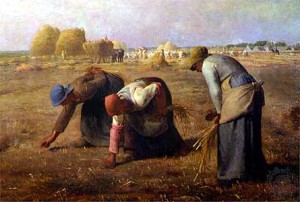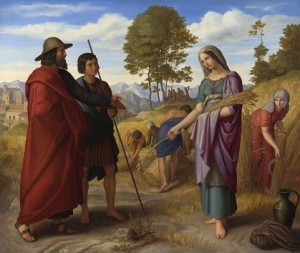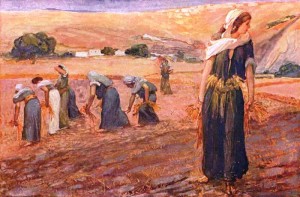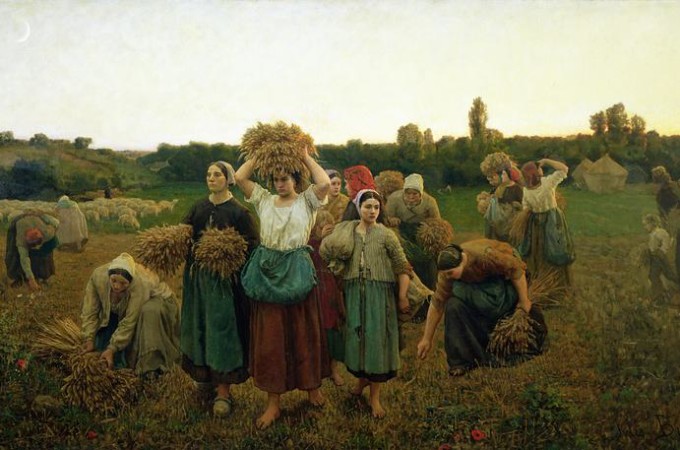Our first installment ended by noting Naomi’s bitterness of soul upon returning to Israel, a widow bereft of her children. But what did Ruth do? And what about Boaz?
Naomi heard that the famine had lifted in Israel, so she and Ruth returned to her village.
 Hebrew law required the land owner to leave part of the harvest for the poor to glean (Lev. 19:9; 23:22). So Ruth joined the gleaners in the field of Boaz, a relative of her deceased father-in-law (Ruth 2: 1-8).
Hebrew law required the land owner to leave part of the harvest for the poor to glean (Lev. 19:9; 23:22). So Ruth joined the gleaners in the field of Boaz, a relative of her deceased father-in-law (Ruth 2: 1-8).
What can we learn from Boaz’s response to this Moabite woman?
1. He recognized this “foreigner” and greeted her as “My daughter” (2:8). We see here a welcoming term of endearment for a fellow human being who was both a stranger and impoverished. Boaz did not shun her or consider her inferior. No, he made room for her in the circle of his community. This is reminiscent of Christ addressing women as “daughter” (Mark 5:34) and “child” (Luke 8:54). He was welcoming and inclusive, not shunning and dismissive, toward the impoverished foreigner. Boaz understood the heart of God that years later would become incarnate in the person of Christ.
2. He asked Ruth to join with the men and women of his household who were involved in the harvesting. He offered protection and sustenance while she worked (2:8-9).
3. In response to Ruth’s question of why she had found favor in his sight, he replied that it was because her self-sacrificial love for Naomi and the fact that she, had in faith, identified herself with the God of Israel “under whose wings you have come to take refuge.” (2:10-12)
4. Ruth humbly recognizes Boaz’s godly character in the way he has treated her (2:13).
5. Boaz welcomed Ruth, a poor, hungry refugee, into his household; he had her sit at his table and then he served her.
At mealtime Boaz said to her, “Come over here. Have some bread and dip it in the wine vinegar.” When she sat down with the harvesters, he offered her some roasted grain. She ate all she wanted and had some left over. (2:14)
 What is this? He served her! Normally it is the poor who serve the wealthy, the woman who serves the man. Did Boaz get it backwards?
What is this? He served her! Normally it is the poor who serve the wealthy, the woman who serves the man. Did Boaz get it backwards?
No, Boaz understands the nature of God and His kingdom. As the successful farmer, he has a responsibility to help those less prosperous than himself. As a man, he is to serve the woman. No male chauvinism here. Here is a man who understands that all people—including women, the poor, and marginalized—are to be treated with respect and dignity. Here is a gentleman.
Boaz responds to the immediate need by providing food for Ruth from his own table. Then he makes longer term provision as well.
As she got up to glean, Boaz gave orders to his men, “Let her gather among the sheaves and don’t reprimand her. Even pull out some stalks for her from the bundles and leave them for her to pick up, and don’t rebuke her.” (2: 15-16)
6. Boaz cared about Ruth’s dignity. She was an impoverished refugee. While Boaz was concerned about her physical situation, he knew that the way he helped her would determine if she became poorer. Ruth still had her dignity. Boaz knew that he could strip her of her dignity if he was not careful in the way he helped her.
What would have been the easiest thing for Boaz to do? What would have been easiest for him and for Ruth? Boaz could have simply ordered one of his harvesters to go to the field and bring back some of the harvested barley for Ruth. Providing for Ruth directly would have been the easiest for everyone concerned. But Boaz was not ruled by “easy,” nor by the pragmatic! He also was not motivated by his feelings, by what would make him feel good. No, he was interested in Ruth’s well-being, concerned for her physically, emotionally, socially, and spiritually.
He recognized that to really help Ruth required more than simply giving her food. She needed an opportunity to work. That would be more costly for himself, for his workers, and for Ruth. So he ordered his servants to go out to the field and take “some of the stalks … from the bundles and leave them for her to pick up.”
 In fact, the harvest was already in progress. The grain had been cut, left to dry, and then bundled to prepare for transportation to the threshing floor. But Boaz ordered his men to take some of the grain out of the bundles and lay it back on the ground, so that Ruth could work.
In fact, the harvest was already in progress. The grain had been cut, left to dry, and then bundled to prepare for transportation to the threshing floor. But Boaz ordered his men to take some of the grain out of the bundles and lay it back on the ground, so that Ruth could work.
Boaz did not give Ruth food directly, he gave her an opportunity to work, to provide for her own needs and the needs of Naomi.
And what did Ruth do?
… to be continued
– Darrow Miller






